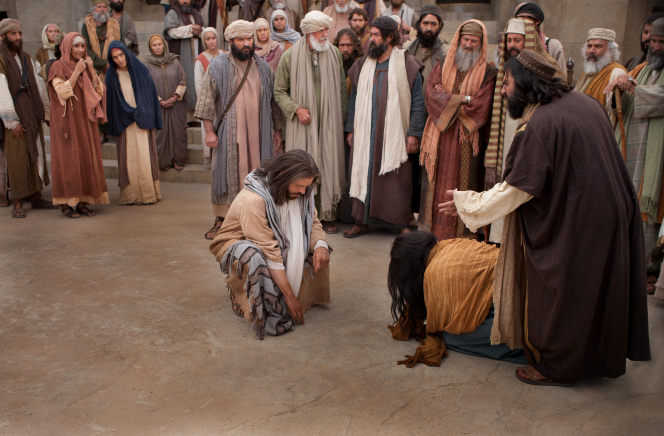 It’s one of the most famous moments in the ministry of Jesus, and it’s also a personal favorite of mine. I don’t want to cover the whole context right now; I mostly want to focus on the end of the account. Jesus is presented with the woman by the Pharisees, He tells them “let he who is without sin cast the first stone” and that puts her accusers in their place and they all disperse…
It’s one of the most famous moments in the ministry of Jesus, and it’s also a personal favorite of mine. I don’t want to cover the whole context right now; I mostly want to focus on the end of the account. Jesus is presented with the woman by the Pharisees, He tells them “let he who is without sin cast the first stone” and that puts her accusers in their place and they all disperse…
When Jesus had lifted up himself, and saw none but the woman, he said unto her, Woman, where are those thine accusers? hath no man condemned thee?
John 8:10
John says that Jesus saw “none but the woman” but again, it is implied that the audience is still there, and in fact Jesus’ words to her bear out John’s meaning: “Woman where are thine accusers?” They had left (the audience had not, but they didn’t matter in this moment; this was between the Lord this sinner who had become a pawn).
As always, when God asks a question it is not for His benefit but for the benefit of the one He asks. Jesus, who knew the hearts of all men He encountered, knew His words had pricked the consciences of His enemies. He knew, even while His eyes were on the ground (while He was writing—v8), that they had dispersed. He asks the question to her because He wants her to consider the fullness of the mercy He is about to bestow. “Has no man condemned you?” He asks, drawing attention to the fact that those who would have accused her, tried her, convicted her and carried out her execution were now gone.
She said, No man, Lord. And Jesus said unto her, Neither do I condemn thee: go, and sin no more.
John 8:11
She replies that her accusers are gone (There is “no man” to condemn her), a fact that is apparent to all gathered around, but still: Just saying it out loud gives it a sense of finality. Her ordeal is almost over, she no doubt thinks. The Lord responds: “Neither do I condemn thee.” Unfortunately, these are words that have been ripped from their context and used to teach error. Jesus is not excusing, condoning or even ignoring the sins of this woman. He just simply refused to go along with her being used as a pawn of the Pharisees against Him. She was guilty of sin, but an innocent victim of the religious leaders’ scheming.
Yet people who insist that Jesus was non-judgmental about people’s “private lives” (as the world would put it) will use his half-statement by the Lord to say “God doesn’t care what we do in our bedrooms!” This is false: Jesus’ next words to her are “Go and sin no more.” The Lord’s words are laced with mercy, yes, but they carry an implied warning and a rebuke of her actions. He calls her actions sinful and tells her to stop.
The question may be raised: Why did Jesus not cast a stone?
He called for the sinless person to cast the first stone, and He certainly was without sin. Why did He not carry out the Divine Prerogative to execute Justice and Wrath against a sinner? Answer: Because God—in this case Jesus—has the right to extend mercy in place of wrath. Mercy abounds greater than the Law (Romans 5:20). Jesus’ mission on earth was not to condemn (ch3:17) but to save (ch3:16). If he stoned the woman, He would have had to stone everyone, for all had sinned.
It’s interesting that Jesus’ ire was usually only brought out when He encountered hypocrites and self-righteous people (such as the money changers of John 2). Everyone was condemned when Jesus got here, but those who acted morally superior, despite their own shortcomings, needed specific rebuke. Why? Because they were the ones convinced that they didn’t need Jesus. The rest of the world’s sinners tended to flock to Him, and thus to them He offered mercy and kindness (Matthew 9:10).
If anything, this text teaches me to be more considerate, more patient, and more understanding of those fallen into sin. Those who think they are above sin are hypcrites of the highest order, but those who are trying and who are seeking don’t need scorn; they need pity, kindness, love and someone to point the way to the Savior.

Leave A Comment